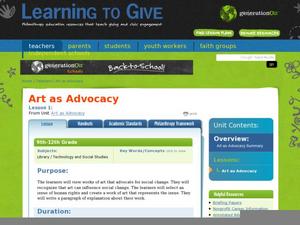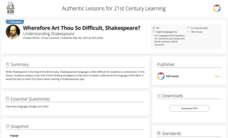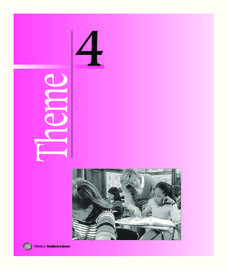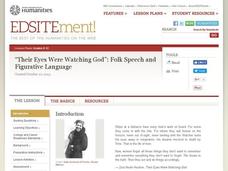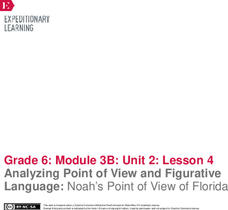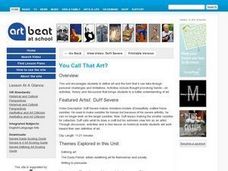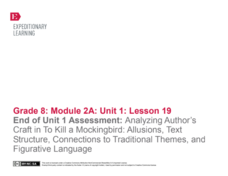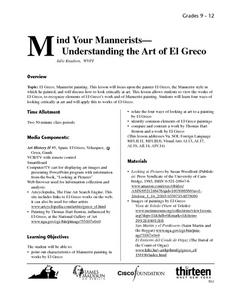Read Works
Figurative Language
Here's a richly detailed unit, designed for second graders, that focuses on decoding figurative language, including similes, metaphors, personification and idioms.
Nosapo
Body Language
When it comes to learning a language and literacy, understanding nonverbal communication is often as important as verbal communication. An interactive body language activity incorporates role play to demonstrate the difference between...
Western Illinois University
Activities for Supporting Oral Language Development
Support young scholars' oral language development with the use of four early childhood activities. To reinforce proficiency, pupils read with an adult, play a game of telephone with their peers, put on a play with puppets or stuffed...
Curated OER
Art as Advocacy for Social Change
“Humanscape No.65” by Melesia Casas and Ester Hernandez’s “Sun Maid Raisins” launch a study of how works of art can advocate for social change. After examining these two works and discussing the human rights issues raised, class members...
K20 LEARN
Wherefore Art Thou So Difficult, Shakespeare? Understanding Shakespeare
'Tis not easy to understand the language of the Bard! But, hark! Fret not! With the assistance of this joyous activity, young players learn how to translate Shakespeare's English into modern language. Groups examine passages from Julius...
Houghton Mifflin Harcourt
Look at Us!: English Language Development Lessons (Theme 1)
Start off your young English language learners with this packet of materials, which covers three weeks of instructions. After completing the unit, kids will have practiced the letters K through Z, read several story books, talked with...
British Council
Learning English through Short Stories
Use short stories to teach English? Yes! Designed as a professional development opportunity for English language teachers, the ideas in this booklet can easily be adapted to advanced ESL/ELL classes.
Houghton Mifflin Harcourt
Problem Solvers: English Language Development Lessons (Theme 4)
How can you teach a text to a group of readers who struggling with the language? The second in a set of three ESL lessons related to Theme 4: Problem Solvers engages English language learners by introducing vocabulary and grammar...
Curated OER
Debates on Persuasive Language That Extend Outside of Class
There is no better sight to see than a classroom full of eager young adults, hands raised high, eager to jump into a class discussion. Get your class identifying and discussing rhetorical strategies and then debating long into the night...
Curated OER
Art Criticism: Understanding Wayne Thiebaud's Salads, Sandwiches, and Desserts
Analysis consists of an understanding and interpretation of evidence and elements found in any number of expressive mediums. Upper graders critique the work of American Realist Wayne Thiebaud through a series of excellent guided...
Curated OER
"Their Eyes Were Watching God": Folk Speech and Figurative Language
Using or considering using Zora Neale Hurston's Their Eyes Were Watching God? Then this packet is a must for your curriculum library. The examination of how Hurston combines folklore and folk language to create the voice of her...
The New York Times
Evaluating Sources in a ‘Post-Truth’ World: Ideas for Teaching and Learning about Fake News
The framers of the United States Constitution felt a free press was so essential to a democracy that they granted the press the protection it needed to hold the powerful to account in the First Amendment. Today, digital natives need to...
J. Paul Getty Trust
Looking and Learning in the Art Museum — Lesson 1
To prepare for a field trip to a local art museum, art class members journal their initial reactions to a reproduction of the work they will focus on during their visit. The whole class then considers the artistic elements in the piece...
Achieve3000
Figurative Language
Similes and metaphors make writing more beautiful and detailed, but can be a little harder to decipher during a first reading. Use a passage from The Man Who Loved Words to show young readers how to think through passages that contain...
Houghton Mifflin Harcourt
Give It All You’ve Got!: English Language Development Lessons (Theme 2)
Go beyond the textbook to gain a better appreciation for the English language. A series of ESL lessons help expand the concepts found in Theme 2: Give It All You've Got. The second lesson in a three-part unit incorporates strategies such...
Houghton Mifflin Harcourt
Talent Show: English Language Development Lessons (Theme 6)
This 32-page packet, the second in the series of support materials for the Houghton Mifflin Harcourt thematic entitled "Talent Show," is designed specifically to support language learners.
Smarter Balanced
How We Learn
What's the best way to learn the elements of the periodic table? The inventions of Thomas Edison? Patience? To prepare for the performance task assessment on how people learn, class members share ideas about ways to learn in a variety of...
EngageNY
Analyzing Point of View and Figurative Language: Noah’s Point of View of Florida
Fishing for words. Scholars search for unfamiliar words in pages 27-29 of Flush, place them in their word catchers, and complete part of Noah’s Point of View graphic organizer. After identifying figurative language, learners analyze tone...
Curated OER
Lesson: Urs Fischer: Reviving the Past Art Movements
Seven major abstract art movements are analyzed by learners in groups. Each group analyzes various works by determining which work belongs to which movement. They then read Flatland, engage in an art and literary analysis discussion,...
Houghton Mifflin Harcourt
Around Town: Neighborhood and Community: English Language Development Lessons (Theme 3)
Here is a unit designed to support English language development. Scholars speak, move, and write to learn more about topics that focus on community and local concepts. The series of lessons aids to reinforce concepts including consonant...
Curated OER
You Call That Art? - Activity 1
Learners formulate a definition of art in the introductory lesson for a unit on various art forms. The learning emphasis is placed on Oregonian artist Duff Severe and reflective writing. Students compose an essay describing various art...
EngageNY
End of Unit 1 Assessment: Analyzing Author’s Craft in To Kill a Mockingbird: Allusions, Text Structure, Connections to Traditional Themes, and Figurative Language
Scholars demonstrate their learning with an end-of-unit assessment. They work independently to discuss the Golden Rule and its relationship in To Kill a Mockingbird.
EngageNY
Summarizing Complex Ideas: Comparing the Original UDHR and the "Plain Language" Version
The eighth lesson plan in this series continues the focus on vocabulary and increasing young readers' awareness of academic language. Pairs of learners participate in a short vocabulary review activity called Interactive Words in which...
Curated OER
Mind Your Mannerists-Understanding the Art of El Greco
Kids become mini-experts on the Mannerist movement and the art of El Greco. They identify common elements of El Greco paintings and compare them to a work by Thomas Hart Benton. They use four ways to examine art taken from the book,...





